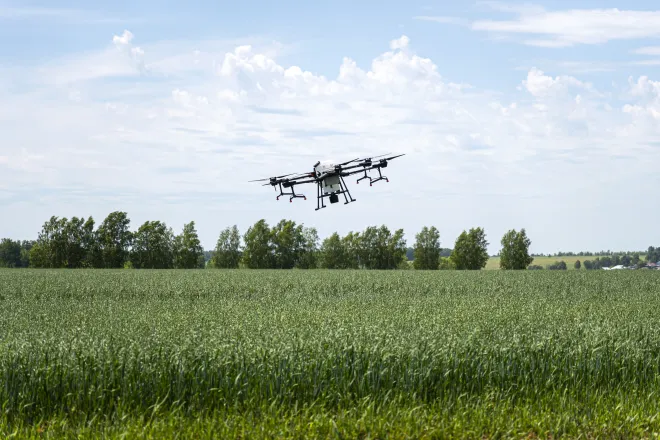
Daily Audio Newscast Afternoon Update - June 11, 2025
© INDU BACHKHETI - iStock-1336427297
News from around the nation.
Military parade marches into political maelstrom as troops deploy to L.A.; CA makers of compostable packaging call for state, federal policy changes; Hog feces detected in NC homes near large farming operations; Could FPL's $9B rate hike deepen FL energy affordability crisis?
Transcript
The Public News Service Wednesday afternoon update.
I'm Mike Clifford.
This is not the image Army officials had wanted.
That's the take from the New York Times.
They report while tanks, armored troop carriers, and artillery systems pour into Washington for the Army's 250th birthday celebration, National Guard troops from the Army's 79th Infantry Brigade Command Team, supplemented by active duty Marines, have been deployed to the streets of Los Angeles.
Max Rose, a Democratic congressman and Army veteran, said the two scenes combined erode trust in the military at a time when the military should be a symbol of national unity.
The Times notes some veterans groups soured on the parade well before the deployments in Los Angeles.
The Army recently asked the Vietnam Veterans of America Chapter in North Virginia if it would provide 25 veterans to sit in the official reviewing stand.
The group said no.
Meantime, California companies that make compostable packaging materials say their products could make a huge dent in the problem of plastic pollution, but only with changes to state and federal policy.
California passed Senate Bill 54 in 2022.
It requires single-use packaging and plastic foodware to be either recyclable or compostable by 2032.
The issue is with a companion bill, Assembly Bill 1201, which said compostable materials must be certified organic.
John Feltz is CEO of Cruise Foam, based in Santa Cruz, making compostable packaging foam from food waste.
The idea that all compostable packaging would have to comply would effectively remove compostable packaging from being viable.
The cost, the tracking, making a fully certified organic packaging material is nearly impossible.
I'm Suzanne Potter.
And new research has detected hog feces in the homes of people who live near industrial farming operations in North Carolina.
The research was conducted in Duplin County in eastern North Carolina, where community members have struggled to convince leaders about the hazards of large hog operations.
Duplin County resident and co-founder of Rural Empowerment Association for Community Help, Devin Hall, recalls a presentation he gave to the county commission.
One of the county commissioners just asked, "Has anyone died and autopsies been performed to prove they died from hydrogen sulfide exposure?"
That was a bit cold, you know, because that's what you're asking for.
You want body bags.
Hogs generate 10 billion gallons of waste every year in North Carolina.
I'm Eric Tegedorf reporting.
This story with original reporting from Dawn Attride for Sentient Science.
Next to the Sunshine State, where Florida Power and Light's request for a nearly $9 billion rate hike, possibly the largest in state history, has sparked concern about the potential burden on people already struggling with high energy costs.
Maria Claudia Shuber-Fontes with Catalyst Miami warns the impact on low-income households could be devastating.
Folks are spending a large portion of their income just to keep the lights on every month.
The Florida Public Service Commission is reviewing FPL's proposal, which the utility says is needed for grid resilience, population growth, and storm recovery.
This is Public News Service.
Indiana's largest LGBTQ+ celebration kicks off this weekend as IndyPride marks its 30th anniversary.
A parade steps off Saturday morning at 10 on Mass Ave, followed by a free community gathering at Monument Circle and a two-day concert at American Legion Mall.
Tina Robb with IndyPride expects tens of thousands of people to attend and says this year's message is about visibility and unity.
Pride started out as a protest, and as we are seeing in 2025, our rights are being stripped away daily.
So while it started as a protest, it's going to continue as a protest.
And this is our 30th anniversary, so we chose to be loud and bigger than ever this year.
Organizers say the expanded festival reflects both the urgency of the moment and the power of community.
I'm Joe Ulari, Public News Service.
Find our trust indicators at publicnewsservice.org.
And immigrant rights groups say they are considering legal action to try and restore a Texas law allowing in-state tuition rates for undocumented college students.
The move comes after the Department of Justice sued Texas, and within hours, state officials complied without a fight.
According to the U.S. Attorney General, federal law prohibits schools from providing benefits to undocumented students that they don't provide to U.S. citizens.
Immigration attorney Kelly Cobb says the law has been on the books since 2001.
They get the same residency requirement as someone that was born here.
And I think it's more of a policy argument.
These were children brought here, and why should they be penalized and have to pay higher tuition?
Texas was the first state to enact such a law to help young adults without legal status.
Conservative legislators have tried to repeal the law for years.
Cobb says if an appeal is filed, a judge could allow the law to remain in effect through the appeals process.
I'm Freda Ross reporting.
Finally, creative folks often say poetry is almost everywhere you look, and sidewalks across the Midwest, including in Minnesota, are proving it.
Sidewalk poetry programs have risen across the region, stemming from an initiative started in Minnesota's capital city by behavioral artist Marcus Young back in 2008.
St. Paul adopted the first such program in the country, inspired by sidewalk contractor stamps.
Young says he remembers thinking, if you can print those logos on these large sections of pavement, why not other things like poems?
I think it all goes back to our universal desire that when we see wet concrete, we want to put our finger in it and just mark that I was here.
St. Paul's program allows residents to claim the sidewalks as their book pages every spring.
This is Mike Clifford for Public News Service, member and listener supported.
Find our trust indicators at publicnewsservice.org. you
















